With the online space slowly but surely shifting into more dangerous territory with censorship, spying, and geo-blocks, people are turning to VPNs to remedy those issues. Now, those browsing the internet without this tool seem completely fine.
However, as soon as they try to access a restricted website or do anything without their ISP knowing about it, the house of cards crumbles. Indeed, a VPN is a great tool for preserving your privacy and it has many other benefits that people are often unaware of.
That’s why, today, I’ll answer this lingering question – do I need a VPN? Right away, I’ll tell you that you’ll most likely find this tool very useful. But if you ask yourself “Do I need a VPN?”, you’ll have to check out its benefits below and see if they seem attractive to you.
Do I Need a VPN? 10 Reasons Why You Should Use It!
A VPN or Virtual Private Network is a tool that conceals your IP address, replaces it with a new one in another country, and gives you impenetrable privacy and security. The tool works rather simply and the whole premise lies in changing your IP address.
However, complex algorithms are the backbone of each service, which is necessary for ensuring smooth performance, top-grade security, and excellent streaming capabilities. Of course, not every provider will bring the benefits that I’ll talk about, so don’t just rush ahead and buy a random VPN.
After answering the question “Do I need a VPN?” by showing you some use cases, I’ll also tell you which provider to get to achieve those benefits. Here are 10 reasons why you should use a VPN.
1. Preserving Your Privacy and Security
The main benefit of a VPN service is its ability to protect your privacy online. This tool comes with a myriad of security features such as 256-bit encryption, a kill switch, and a choice of protocols that ensure your connection can’t be traced.
We’ve explained these features in our article about what is a VPN which you can check here. However, the crucial thing to know is that the tool will completely anonymize your traffic, conceal your IP address, give you another IP in a foreign country, and make you anonymous online.
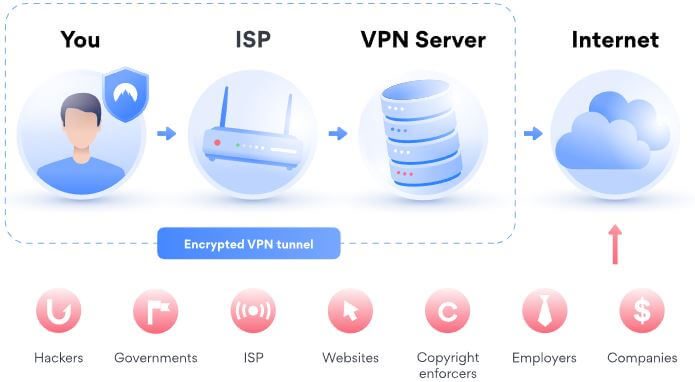
This means that you can browse the web without your Internet Service Provider (ISP) knowing about your activities or anything you do online. Without this service, you’re under constant surveillance from the ISP, which is all but pleasant, especially knowing it follows your every step.
Another point to mention is that a VPN often comes with a no-logging policy. This means that, unlike your ISP, it stores no information about your browsing activities, IP address, or DNS requests, which is another awesome thing, as it aids your anonymity online.
Therefore, when using a high-quality, reliable provider, you can be sure everything you do online is known only to you. And with a new IP in place, even if someone intercepts your connection (which is impossible), he’ll never see your identity, as you’ll be just another person in a random country.
2. Unblocking Restricted Content Online
The IP change that a VPN gives you is beneficial for bypassing geo-restrictions. You see, some streaming websites will restrict their content based on your location. Try visiting a British TV channel if you’re not located in the UK – can you watch anything?
No? Well, there you go. A VPN is here to fix this issue by replacing an IP address from your country with an IP in another country, thus, changing your online location. Next time you visit the TV channel with a British IP address, you’ll find that it works with no issues as if you’re really located in the UK.
The same applies to unblocking Netflix libraries from the US, Canada, Japan, or any other country. If it’s not streaming that you’re seeking, we’re also talking about unblocking any geo-blocked website. It can be an online bookie, Wikipedia page, VoIP service, or torrent website.
3. Downloading Torrents Anonymously
Speaking of torrent sites, did you know that a VPN can be used for anonymous torrenting through BitTorrent or any other client? Torrenting without VPN protection is extremely dangerous, especially in the US or countries of the European Union.
There are two main dangers here. One is your ISP and the authorities that will smite you for downloading copyrighted files from torrent sites. This is pretty fair if you ask me, but sometimes, you can accidentally download a copyrighted file without knowing about it.
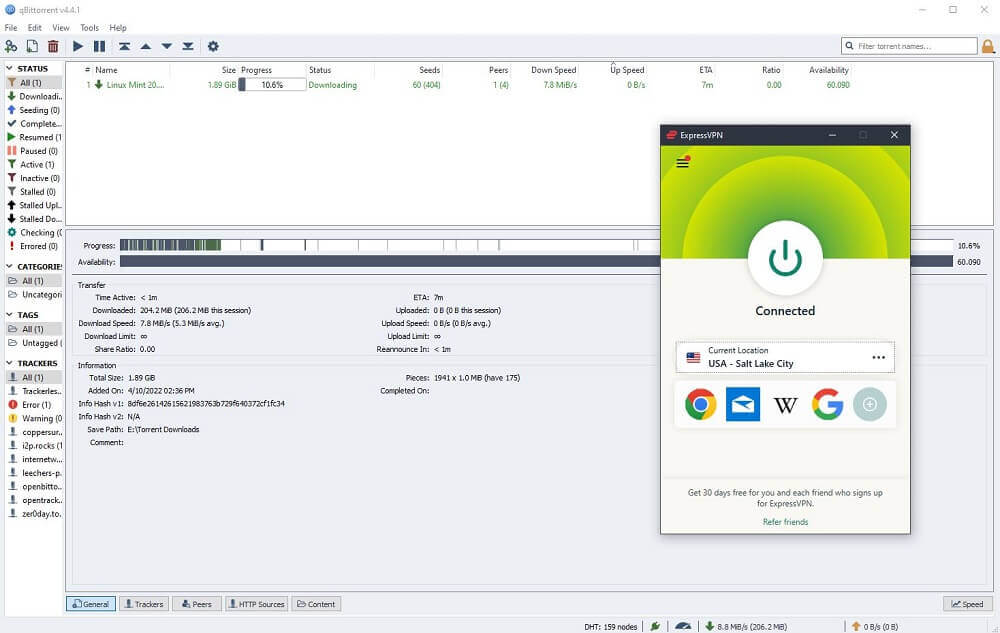
If you’re caught, and you will be because of ISP surveillance, you’re looking at a juicy fine (thousands of dollars) or jail time, depending on your jurisdiction. A VPN will conceal your IP, anonymize your traffic, and make it impossible for your ISP to see what you’re doing or downloading online.
Another danger stems from torrent sites. They’re known for storing logs of your IP and downloading history, with complete dates, times, and files you downloaded. Moreover, they’re riddled with malware, spyware, and hackers, which puts you in additional danger.
Thus, if you’re still wondering “Do I need a VPN if I’m downloading torrents?”, the answer is YES. With the security and privacy of this service, neither your ISP nor torrent sites can trace you and collect your personal data, so you can download torrents to your heart’s contempt and anonymously.
4. Going on the Dark Web Safely and Securely
Are you thinking about using Tor to go on the dark web? In that case, know that Tor alone isn’t going to anonymize your traffic completely, as it has several potential issues. Most notably, Tor’s entry node isn’t secure and some nodes inside the Tor network can be compromised, which leads to more trouble.
Although it’s a “basic” tool for anonymity and works in many cases, you simply can’t risk your ISP knowing about your dark web voyages. Knowing the dark web’s association with illegal activities, you can definitely be a suspect in your ISP’s eyes.
That’s where a VPN comes in. With its ability to encrypt your connection and hide your IP, using it in conjunction with Tor is a surefire way of browsing the dark web safely and privately. Make sure to use a VPN first and THEN connect to Tor.
This way, you’ll fix the problem of the entry node and prevent your ISP from knowing that you’re using Tor at all. In addition, you’ll mask your activities on the dark web, so you get complete privacy.
5. Saving Money on Purchases Online
Do I need a VPN if I’m often shopping online? The answer is YES. Trust me – I’m a shopping maniac sometimes and I use this service to save quite a lot of money on digital products, vacations, hotels, and whatnot.
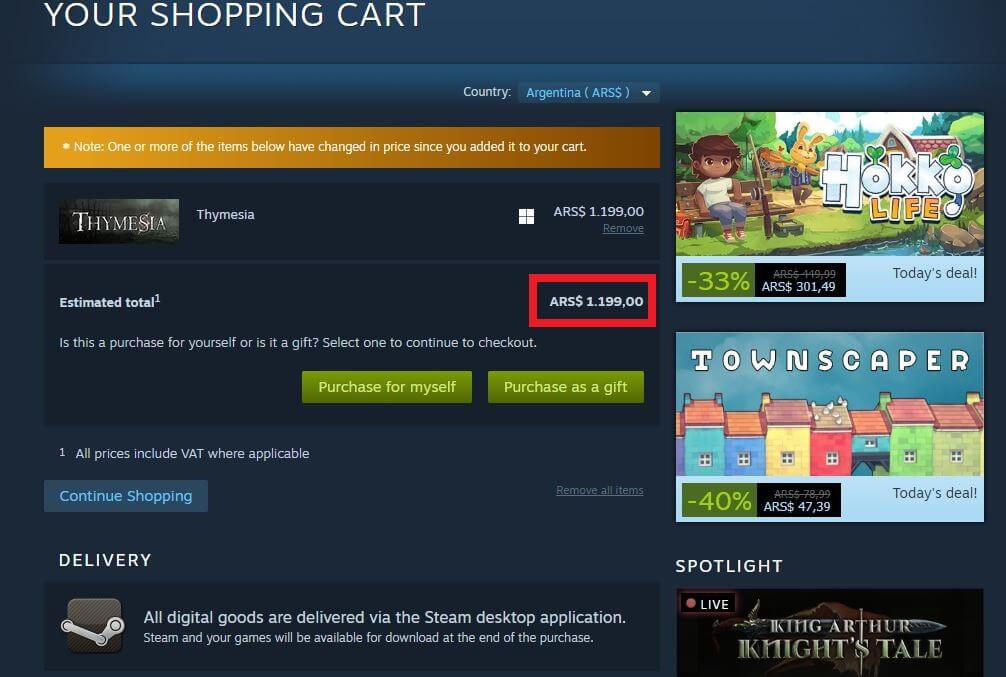
Prices of different products depend on your location as well, which especially rings true for hotel rentals, flight tickets, software, and games. For example, you can use a VPN to change your Steam country and buy games at a significantly cheaper price (up to 60% cheaper!).
Or you can connect to a VPN server in a country with lower living standards and buy the same flight tickets at a lower price. People use this trick to save hundreds of dollars annually on their vacations, which still ends up being useful, despite VPNs being paid services.
After all, these services cost you a few dollars a month and you’ll agree that flight tickets can cost way more – reaching more than $1,000 depending on the length of the travel. By using this service, you can change your IP address and inspect your options closely.
Believe me – you’re in for some serious savings not only on travel but also on games, software, Netflix subscriptions, and so much more.
6. Accessing Sports Live Streams Across the Planet
If you’re a fan of sports, it feels debilitating not being able to access live streams of your favorite teams.
The solution is quite simple, as you can often watch F1 races on a free channel using a VPN. We can say the same for many other sports, such as MotoGP, football, NBA, or any other sport you want.
7. Staying Safe on Public WiFi Networks
Public WiFi networks are dangerous because they’re often unencrypted and don’t have advanced security measures. In tourist zones, this is especially prevalent and we know of many cases of cyber-attacks that ended up in people losing their credit card numbers and personal data.
It’s easy even for amateur hackers to hack into a WiFi network of a local restaurant or cafe, and through people’s IP addresses, track their online activities, steal passwords, and get a hold of their private information.
If I often connect to public WiFi, do I need a VPN? YES, absolutely! With it, you’ll route your traffic through a VPN server, change your IP, and encrypt your connection, which prevents hackers from intercepting your connection and seeing that you’re on public WiFi at all.
Even if a hacker intercepts the connection, which, once again, is impossible, it’ll be a garbled mess and he won’t be able to read it, thus, preventing him from finding out any information.
8. Securing Your VoIP Communication (Calls & Chats)
Living in a country like Iran or the UAE is often unpleasant because of the level of surveillance that plagues the entire nation. The authorities in these countries are known for blocking VoIP services and imposing their own so that they can spy on your calls and read your messages.
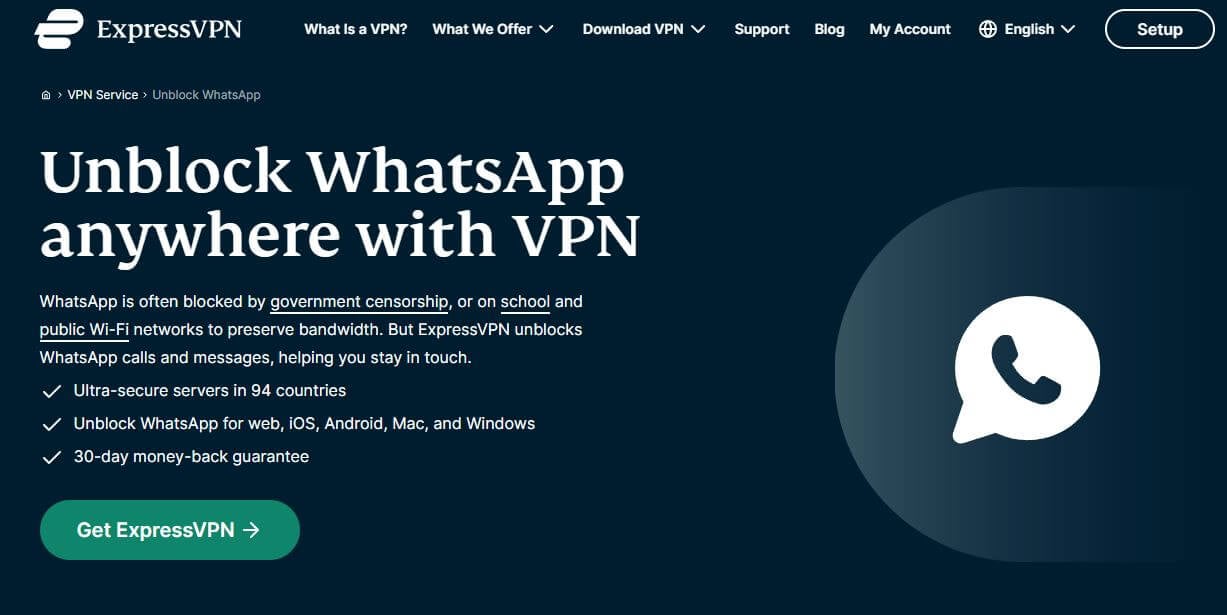
For example, you can use a VPN to access WhatsApp in Iran and unblock Skype, Viber, and other services in the United Arab Emirates. Not only that but when you connect to a server, you’ll make your connection untraceable, which means you can safely call and text without ISPs spying on you.
This makes the entire VoIP communication experience anonymous and private, letting you talk about whatever you want without consequences. Of course, this applies to both texts but also audio or video calls that you can conduct securely with a VPN.
9. Researching Sensitive Topics Anonymously
Many people ask me “Do I need a VPN if I’m a journalist or whistleblower?” And I always nod my head in approval because being a journalist or anything similar is dangerous in today’s world.
I mean, just think about all the journalists who lost their heads because they researched something that “the powers that be” deem unallowed. Researching sensitive topics is quite dangerous, yet it’s vital if you’re looking to be a good, honest journalist.
Journalists are often naive, especially young ones, and they don’t take necessary measures to secure their connection and prevent the authorities from tracking them. But with a VPN, it’s easy to cover up your tracks by changing your IP and pretending to be someone else.
In doing so, your research will be safe and anonymous, letting you gather information in secrecy. The same applies to whistleblowers on the dark web or in general, who MUST conceal all their tracks. As you can see, a VPN can quite literally save your life.
10. Avoiding ISP Throttling
The last answer to the question of “Do I need a VPN?” lies in bandwidth throttling – or avoiding it, so to speak. Bandwidth throttling or ISP throttling is when your ISP intentionally slows down your connection during bandwidth-hungry activities like torrenting, gaming, or streaming.
This results in a laggy and unsatisfying experience that prevents you from enjoying the activities properly. Because the ISP knows your IP and it can control what you can do online, it can impose speed limits as well, so if you have unexpected slowdowns, know that this is your ISP’s doing.
Thankfully, concealing your IP with a VPN fixes this problem and prevents such things from happening. In this case, a VPN will not slow down your internet speed but actually increase it by unclenching your ISP’s grip on the connection performance.
Which VPN Should I Use? ExpressVPN!
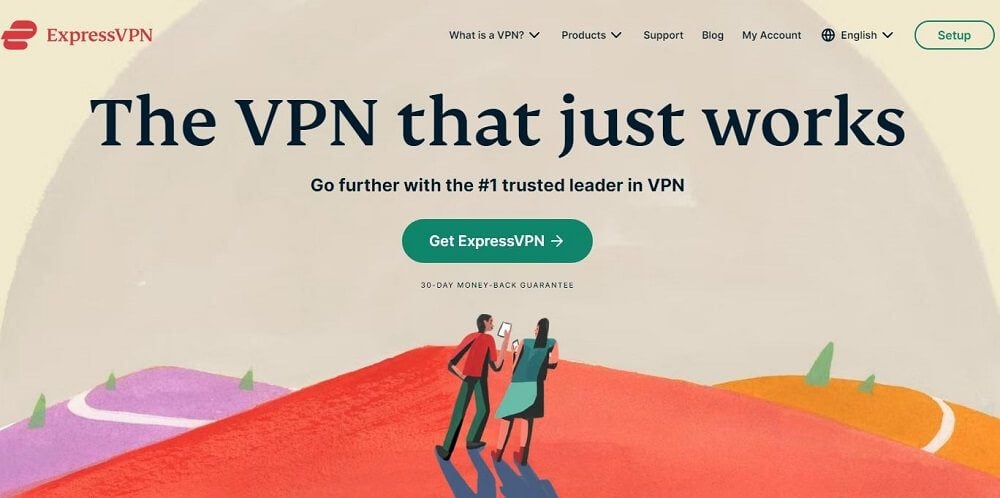
Now that you know why you might need a VPN, I think it’s time to talk about ExpressVPN. All of the 10 benefits of this service can be achieved by a provider like ExpressVPN. I invite you to check out my ExpressVPN review as well, where you can find out all about its performance and quality.
For now, I’ll mention its 3,000 servers in 105 countries that serve perfectly for unblocking geo-restricted content and accessing Netflix libraries. In addition, the provider offers cutting-edge 10 Gbps servers which grant the fastest speeds around, excellent for gaming, torrenting, and 4K streaming.
ExpressVPN is a powerhouse of privacy and security as well. It offers a Lightway VPN protocol made by ExpressVPN itself, coupled with military-grade encryption and an automatic kill switch that prevents potential IP and DNS leaks, resulting in uncompromising privacy.
Speaking of which, the provider has a no-logging policy, meaning it stores zero logs of your activities and personal data. Everything is accompanied by its easy-to-use applications that can be installed on a boatload of platforms and devices.
ExpressVPN works on iOS, Windows, macOS, Linux, Android, Apple TV, Smart TV, routers, gaming consoles, and many other systems. Not to mention its 8 simultaneous connections, letting you protect EIGHT devices at the same time at NO additional cost!
All in all, ExpressVPN is a provider with no specific downsides that will serve you well in every possible scenario. Through 01net, you can get a special 49% discount and 3 free months for its 12-month plan, so you basically enjoy a 15-month subscription at the price of a 12-month one.
We also want to mention a 30-day money-back guarantee for all plans, making it easy to get a refund if you’re not satisfied. If you’re still thinking “Do I need a VPN?”, I think you can start considering it, especially now that you can try it risk-free without losing money.
So, Do I Really Need a VPN?
This discussion hopefully helped you in deciding on whether or not to get a VPN. There are plenty of benefits of this service, some of which aren’t mentioned on this list. However, even without going into too much detail, you can see that this service is very useful.
Apart from securing your connection and ensuring anonymity, it can increase your internet freedom, save you some money on online purchases, and everything else we talked about. Now, the question “Do I need a VPN?” is pretty complex and depends on your needs.
If any or all of the aforementioned points concern you, then you definitely need it. But if you think it’s not necessary to stay safe online or enjoy any of the benefits I mentioned, most likely, you wouldn’t want to use a VPN.
Although, I still recommend testing ExpressVPN or any other provider just to see how it works out for you. You might fall in love with it unexpectedly.
FAQ
After everything we said, it’s clear that you NEED a VPN. Still, for those in need of additional info, let’s address three more questions.
Which VPN to use?
As said previously, we recommend ExpressVPN. It’s the fastest, most dependable VPN your money can buy. That doesn’t mean other providers are bad in comparison. CyberGhost is a remarkable choice with cheap prices that you’ll most likely be able to afford.
On top of that, this service has nearly 10,000 servers with an impressive 45-day refund policy. Users can also try NordVPN if these two don’t seem satisfying. This provider is the most popular in the world, with 5,500+ fast servers, Threat Protection, and even Meshnet for remote control.
Finally, we should also mention Surfshark with unlimited connections and cheap prices that you’ll undoubtedly enjoy. All of these VPNs are top-notch and won’t cost you a fortune for the performance they provide.
Should I pick a free VPN?
You should if you have no other choice. However, this isn’t always the case because free VPNs can be more dangerous than not using a VPN at all! Many of them keep logs and fail to protect your privacy. Instead, they endanger it through excessive logging and selling your private info to third parties.
If you’re after a free provider, you can try Atlas VPN perhaps. It’s limited to 5 GB a month but stores no logs and even works with Netflix US from time to time. ProtonVPN is also legit, with unlimited traffic but slow speeds and the inability to download torrents.
All in all, we recommend avoiding free VPNs if you don’t want to take any chances. Get a premium provider and you’ll be thankful for your choice. Unlimited traffic, impentrable security, and strong privacy – these things won’t be there in your free VPN subscription.
Are VPNs a scam?
No, they’re far from it but again, this depends on the VPN you want to use. The providers we addressed in this article are legit companies. Now, do you need a VPN that’s a scam? Obviously not. There are plenty of examples to be given when talking about “scammy” VPNs.
These include Betternet, Hola, Urban VPN, Turbo VPN, AmanVPN, and many more. They have one thing in common – they’re free! That should immediately tell you something…